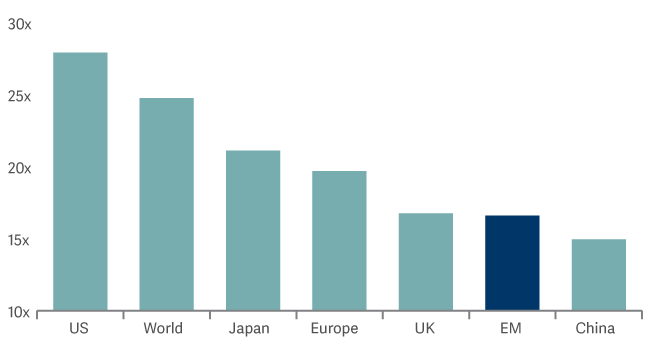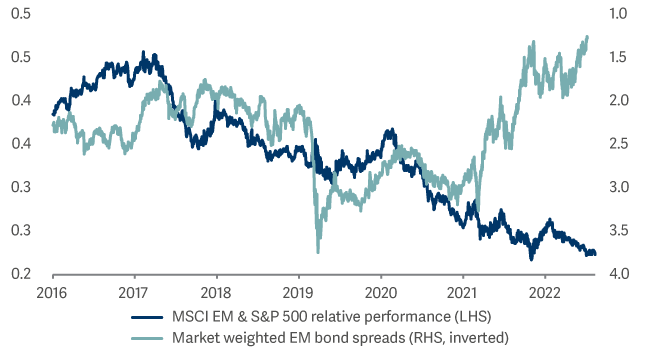Don’t let the ‘madmen’ put you off emerging markets
As Argentina elects ‘El Loco’ (the Madman) as its new president, Artemis Global Income manager Jacob de Tusch-Lec says you shouldn’t let your prejudices cause you to miss out on opportunities in what is becoming an attractive hunting ground for investors.
Many global investors have little exposure to emerging markets because these countries are deemed unsafe. There are so many things to worry about – populist politicians causing havoc on the streets; economic turmoil; rabid inflation; governance issues; and central bankers’ questionable competence.
But look again at that worry list and lots of it can apply to developed market nations, too. Think back to Donald Trump’s riots on Capitol Hill in the US and the Truss regime in the UK. At the Conservative party conference, we heard calls for the prime minister to be able to fire the Bank of England governor. The Federal Reserve is under fire in the US too.
A case could be made that emerging market central bankers have demonstrated more competence than their counterparts in the developed world. Many started hiking rates much more aggressively and much earlier than the Bank of England and European Central Bank and they are now ready to cut them.
I do not want to trash developed market economies. The real point here is that those of us living in them can often hold prejudices about so-called emerging economies that deserve to be challenged.
Increasing our emerging market exposure
We have been increasing our exposure to emerging markets recently, and in particular to Brazil, where inflation is just 4.8%1 – similar to the UK’s .
Brazil is an agricultural heavyweight, supplying soya beans, beef, coffee and sugar (among other commodities) to many parts of the world. This abundance of natural resources gives the economy significant advantages. For much of 2022, elevated commodity prices and the central bank’s decision to hike interest rates early and quickly supported the equity market2.
In recent months political risks have taken centre stage, as they often have for Brazil in the last few decades. Former two-time president Luiz Inácio Lula da Silva beat incumbent president Jair Bolsonaro in October. Investors worried about Lula’s fiscal plans and the potential impact of his left-wing administration on state-controlled enterprises.
Historically, we have found periods of political uncertainty present good opportunities for investors. Selling can often be indiscriminate in volatile periods.
Last month we saw the success of “El Loco” – the Madman – Javier Milei in neighbouring Argentina. The former TV pundit (echoes of Trump?) won huge support after waving a chainsaw at campaign events, threatening to take it to the economic and political status quo. Supporters began to bring their own chainsaws to events.
Yes, it sounds risky in every way. But politics often matters less than economics, especially with multinational companies.
“Lowest-ever valuations”
While not oblivious to the political risk, we focus primarily on the fundamentals of the businesses we might invest in. In Brazil, substantial dividends are on offer, with good growth and attractive valuations. Despite improvements in balance sheet positions, some state-controlled businesses are trading close to their lowest-ever valuations3.
With interest rates at 12.5 %4 and inflation lower than in some parts of Europe5, financials stand to benefit from the favourable spreads and real yields on offer. This looks enticing and explains our investment in Banco do Brasil (we also hold Petrobras).
The cyclically adjusted Shiller p/e ratio suggests investors view the UK alongside China and emerging markets

If you invest in emerging markets, you can expect more volatility. You do have to watch the newsflow. And you have to watch out for poor corporate governance. There is often government risk, as we saw following Russia effectively confiscating western-held shares following its invasion of Ukraine. If you invest in Chinese state-owned enterprises are they run for China or for western shareholders?
These issues will always be there. But the notion of emerging markets is changing. Many of us will certainly have more exposure to them than is immediately apparent.
Indirect exposure to emerging markets
Take my portfolio. Half of HSBC, listed in the UK, is in China. The shares are cheap enough that if China’s current troubles became bigger, it would not create major losses. Spain’s Santander is big in Brazil and the UK. And Japan’s Mitsubishi Financial Group owns banks in Thailand and Indonesia.
Many large multi-national companies in emerging markets are now coming on to our radar. Shares are about as cheap as those in the UK, which are famously beaten up. That signals an opportunity for those who can see it and helps to explain why we have about 9% of the Artemis Global Income fund in the UK and a similar amount in emerging markets.
EM equity has significantly underperformed DM equity for several years

Preconceptions and prejudices can cost us as investors. Those who do their research may find many emerging market countries more stable than they expected and an array of well-run, multi-national companies as good as any in developed countries. On current valuations, and for income investors in particular, now seems a good time to consider including some in your portfolio.
2https://www.ft.com/content/1edfd86d-0628-40a1-a919-2afaeb3aaf51
3https://www.vaneck.com/us/en/blogs/emerging-markets-equity/brazil-beckons-with-low-valuations-and-growth-potential/
4Bloomberg
5https://www.ceicdata.com/en/indicator/brazil/policy-rate
6https://ec.europa.eu/eurostat/documents/2995521/17907993/2-17112023-AP-EN.pdf/ed17ee00-c92c-3bac-8dc7-a4a2bb78074a

